- Home
- E. M. Foner
High Priest on Union Station (EarthCent Ambassador Book 3) Page 11
High Priest on Union Station (EarthCent Ambassador Book 3) Read online
Page 11
“If it’s acceptable to the synod, I will remain on Kasil until after the inauguration of the new High Priest,” Dring said. “I have never witnessed a Grand Competition, and perhaps I can be useful in facilitating communications with some of your less forthcoming species as well. I have quite a bit of experience in this area.”
“I’ve seen him talk with insect things,” Kelly seconded Dring’s claim. “And trees, he’s really good with trees.”
“Of course you are welcome Ancient One,” Yeafah replied. “It goes without saying. And perhaps your friends with the funny spaceship, the Cricks, would like to remain as well. We owe a special debt to young Becky for starting the process that brought the ultimate resolution to our wealth disposal problem, and all children should spend some time in the fresh air and sunshine.”
“I can’t give Dorothy up for that long,” Kelly immediately told Joe. “We can schedule a longer visit the next time, but I can’t go back and leave my daughter with the Cricks for a month. She’s only seven.”
“Of course not,” Joe replied. “I wouldn’t agree if you wanted to leave her behind, but nobody was suggesting it.”
“Oh,” Kelly said apologetically. “I guess it’s thinking about the children on this planet that brings out my maternal instincts. No offense, Yeafah, but I just don’t understand how parents here could raise generation after generation of children with the ultimate goal giving them to the Darkness.”
“It would be difficult to understand for outsiders,” the High Priest agreed. “But as I was telling Dring in response to his endless questions about demographics the other day, most Kasilians did choose not to have children. We are much longer lived than humans, so it’s only been twenty or so generations since we requested the Stryx to close our tunnel exit, and we’ve seen negative population growth in all but the last couple generations. Even when I was young, it was still common to see far more old people than children. Now the opposite is true.”
“So the closer you come to annihilation the more you want to have children?” Kelly sputtered. “That makes no sense to me!”
“Survival is a natural instinct among all biological species,” Dring answered in the place of the High Priest. “I can think of several explanations for why Kasilians might be driven to increase their numbers at this late date. I strongly believe that it’s a hopeful sign.”
“I know it may seem unfathomable to somebody in your situation, but my ancestors did not have a high opinion of themselves, or anybody else for that matter,” Yeafah said as she adjusted her position on the unpadded wooden wagon bench. “They believed only in material things, what they could see through their telescopes or hold in their hands. Those who embraced the philosophy of materialism with the greatest force were recognized as our leaders, and if not for the coercion exercised by the Stryx, we might have made war on the entire galaxy in our drive to acquire more.”
“I don’t want to sound disrespectful, but you and your people don’t seem anything like your description of your ancestors to me,” Kelly said, even as she felt a sudden wave of nausea from the swaying of the wagon.
“Thanks to the teachings of the Prophet Nabay,” the High Priest acknowledged, moving her right hand in a clockwise circles over her head in honor of his name. “He taught us how to use the consensus to work together towards a unified goal, the very goal you now wish us to abandon. He established the rules for the competitions to select new priests, and the Grand Competition to select his own successor and future High Priests.”
“I understand that the tests consist of a series of mathematical and cosmological problems,” Dring interjected. “What I don’t understand is how you draw them up for each new competition. Surely you can’t recycle the same questions over and over again for thousands of years.”
“It’s a point of honor among us that nobody works on Nabay’s challenge problems outside of the competitions. I was elected High Priest without solving any of the challenges in the allotted time,” Yeafah replied. “But everybody agreed that I got further along towards solutions than any of the other candidates. After becoming High Priest, I checked the Book of Succession out of curiosity, and it turns out that Nabay himself didn’t bother solving the problems.”
“Let me get this straight,” Kelly said. “You choose the sole leader of your entire civilization based on partial credit?”
“What do you have against partial credit?” asked Jeeves, who had recently developed the habit of soundlessly floating up to people. Kelly called it “sneaking up,” but Paul defended his Stryx friend, insisting that it was just a lack of perceptiveness on the part of the humans. “The whole EarthCent recruitment process is built on partial credit.”
“Ah, Stryx Jeeves,” the High Priest spoke with obvious pleasure. “I was just telling Kelly how much I admire the Stryx system for matching people with jobs. My greatest disappointment during my time in office has been with our administrative failings. For all the effort we put into selecting and promoting priests, I sometimes believe the outcome would be better if I randomly picked farmers off the street on market day.”
“The performance of biologicals can be tough to predict,” Jeeves agreed sympathetically. “While it’s hardly my line of work, I can tell you that the basic Stryx system for finding talent among our fosterlings is to give them ample opportunity to fail upwards.”
“What’s that supposed to mean?” Kelly asked sourly, expecting to become the butt of yet another of the Stryx’s elaborate jokes.
“Think of it as a different form of partial credit, one that awards employees for outcomes rather than for taking a defensible analytical approach,” Jeeves answered. “Sufficiently intrusive testing can determine the capacity of a biological to take certain actions or solve certain problems, but capacity doesn’t translate directly into results.”
“I believe Jeeves is saying that they value the right answer over the right reasoning,” Dring simplified the convoluted explanation offered by Jeeves. “My own observations of humanity, supplemented by reading from Kelly’s library, shows that you assign a great deal of importance to processes and certifications. I believe it’s due to your history of working for wages, and your desire to prove your value to employers through achieving quantifiable tasks, even if they fail to bring about an overall solution.”
“How else could we have done it?” Joe asked. “I mean, if I got hired to protect a princess of some little kingdom, are you saying I shouldn’t get paid if her father loses the war and she can’t return home?”
“If Union Station was under attack and you were choosing a guardian to protect Dorothy, would you rather hire somebody who took her away while your home was destroyed, or somebody who protected her by foiling the attack?” Jeeves asked in response.
“But you stated the goal was protecting Dorothy!” Kelly defended her husband. “If you want to hire somebody to protect the whole station, you should say that.”
“At the risk of sounding morbid, that’s not the way I see it,” Jeeves responded, and presented a Kelly-like hypothetical. “Let’s accept for the moment that you hire somebody to protect Dorothy, who takes her off the station while it’s being destroyed. Then the attackers leave and destroy Earth. So you and Joe and everybody you know are all dead, and some stranger you’ve hired to protect your daughter has nobody left to return her to, and has to decide whether to adopt her or sell her.”
“Well, if you’re going to introduce an unknown force that can destroy Union Station into every problem, you may as well just declare every other solution will fall short,” Kelly huffed.
“I believe Jeeves is saying that clear-cut problems with simple solutions aren’t the real challenge,” the High Priest weighed in on the side of Dring and Jeeves. “That’s certainly what I’ve learned through my own management experience. It’s easy to find priests who will go where I send them and do exactly what I tell them, but what I really want is priests who will go where they’re needed and do what’s required without bei
ng told.”
“They did hire and promote you, Kel,” Joe said, suddenly switching sides in what Kelly saw as an act of gross betrayal. “How many special ambassadors do the Styx even employ?”
“Just her,” Jeeves replied cheerfully.
“Are you saying that my main qualification is a talent for failing upwards?” Kelly demanded. “Why not say you hired me because I’m lucky.”
“Technically, I didn’t hire you at all,” Jeeves replied. “Gryph chose you for special ambassador because of your track record and availability. If you choose to believe your accomplishments are a matter of luck, I just hope it doesn’t run out.”
Kelly was still trying to think of a smart reply when another wave of nausea hit her and she threw up over the side of the wagon.
Thirteen
Despite the fact that his research had reached the point where he needed a ship for experiments, Paul was disappointed when the Nova returned to Union Station a week earlier than expected with Jeeves and the McAllisters as the only passengers. As soon as they had the house to themselves, he and Aisha had fallen back into the habit of having supper together, and they both felt like an invisible barrier had been removed from between them. In an ironic twist, Blythe had started showing up at the embassy every day to have lunch with her mom and Aisha, but had been too busy with business most evenings to see Paul.
“I’m glad to see you kept busy while we were gone,” Joe commented to Paul disingenuously when he got back from his morning tour of Mac’s Bones and found his foster son eating breakfast with Dorothy. “Are you trying to create Union Stations biggest ball of junk so we’ll have a tourist attraction for the camp grounds?”
“Biggest ball of junk?” Dorothy echoed, her eyes opening wide with excitement. “I want to see!”
“I made it a ball to save space and reduce structural stress,” Paul explained. “Any shape would work as a counterweight for a centrifugal acceleration swing.”
“If it goes higher than my swing, I want to try it first,” Dorothy said, putting in her claim to priority.
It struck Joe that in the absence of both Metoo and Kevin, keeping his daughter entertained when she wasn’t in Stryx school could turn into a full-time job for the stay-at-home father. He started mentally reviewing his schedule for the week to see how much of it was kid-friendly. Dorothy always enjoyed watching him work in the brew room and she wasn’t bad at measuring ingredients. But he also had a backlog of repairs to camper’s ships to take care of, and she was too young to trust around welding and suspended weights. Then Blythe walked in and he remembered that he could always call InstaSitter.
“Your guinea pig is here on time,” Blythe announced herself grimly, even though she attempted a smile. She held up a large purple envelope embossed with the name of one of the big passenger liners. “I brought my own sick bag, if you were wondering. Hi, Dot. Hey, Joe. Is this thing going to work or am I going to be getting reacquainted with my breakfast?”
“I was just about to explain it to Dorothy,” Paul replied, and began to answer his younger sister’s question about the swing height. “It’s not a swing like the one on Dring’s tree because it hangs from the Nova on a single cable and it goes all the way around in a circle. Do you remember what you told me about how you feel when you swing?”
Dorothy scowled in concentration, as if being asked to remember something she’d said on a previous occasion was an onerous task. “I was floating when the swing was high and heavy at the bottom.”
“That’s right,” Paul said encouragingly. “At the bottom of the swing, the rope is working hard to keep you from falling as your direction is rapidly changing, and you feel that change in acceleration as being heavier. It’s the same idea as the way Union Station gives us weight by spinning.”
“I don’t believe you,” Dorothy replied with a superior air. “Mommy says it’s magic. You’re just using big words because you don’t know.”
“I vote for magic too,” Blythe concurred, even though like all station children, she had mastered the basic principles of motion in space by her early teens. “But when I travel in smaller spaceships, the ones without enough magic, I get sick. And children who live for months in small spaceships without magic, like Kevin, don’t grow up right unless they exercise all the time. Paul wants to fix that.”
Dorothy nodded solemnly, accepting Blythe’s practical explanation. Paul shrugged helplessly at Joe, who recalled the discussion about finding good employees that the High Priest had started with Kelly after they arrived at the Kasilian spaceport. Maybe the secret to InstaSitter’s success was that Blythe saw the universe the same way as the Stryx, favoring serviceable solutions over analytical approaches.
“I built the big magic ball for the Nova to tug into space so it can have something to swing around.” Paul tried to adjust his explanation on the fly for his seven-year-old audience. “The idea is that a small spaceship, like the Nova, can start a trip by using fuel to go faster and faster until it reaches its traveling speed. Then it lets out the magic ball on a long cable, and small navigation jets on both the ball and the ship start them swinging around each other, so they both experience magic weight as they coast along together. At the end of the trip, the jets stop the spinning, the Nova hauls the magic ball back in, and then slows down the normal way.”
“And because I take after my mother in getting sick so quickly in Zero-G, Paul is using me as a test subject,” Blythe added.
“I still don’t understand why you went to the trouble of building a mass from scrap, I mean, a magic ball,” Joe corrected himself. “Everybody knows that the physics will work, but it’s not a practical solution because hauling a magic ball around for a counterweight wastes too much fuel, and fuel is money. Why didn’t you just start with using another small ship as the counterweight, since that’s closer to your ultimate goal?”
“For one thing, I had extra time on my hands while I was hanging around Mac’s Bones in the mornings to handle the camping business,” Paul reminded Joe pointedly. “And I’d like to get some practice in before I try to talk somebody into trying it with a real ship. Using navigation jets to spin the ships slowly around a common center of mass when you’re already traveling pretty fast gets tricky.”
“Can’t you start us spinning while the magic ball is still close, and then let the cable out gradually?” Blythe asked.
“If you don’t mind the feeling that your head and your feet aren’t accelerating at the same rate,” Paul reminded her. “That’s the reason for a long cable, to move the center of mass, the axis of rotation, as far from the ship as possible, so there’s no noticeable difference. Otherwise, you could get the same feeling of weight at any length by just swinging around faster or slower.”
“Swinging around the magic ball,” Dorothy added knowledgeably as she finished her sugary breakfast cereal.
“Come on, Princess,” Joe beckoned to his daughter. “We’re going to mix up a big batch of beer, and then we’ll go to the Shuk and you can pick out some fruit for flavoring.”
“Blueberry!” Dorothy responded enthusiastically, and the two of them headed downstairs to the brew room on the first floor of the converted ice harvester.
“That’s one happy little girl,” Blythe commented wistfully after the father and daughter departed. “What do the Stryx have her doing for barter work now that Metoo isn’t here?”
“Libby said she’d built up a lot of extra credit since Metoo practically lived with us for two years, so they’re letting her slide until it becomes clear whether or not he’s returning to school. Since Kelly already spends time reading with her every day, she’s way ahead on the basic curriculum, and she only has an in-person class with other kids to do projects twice a week at this age,” Paul answered. “So, are you ready try this?”
“Ready as I’ll ever be,” Blythe replied, and the two of them headed out to the Nova’s berth. Paul had already used the magnetic grapples to rigidly link the ship to the ball of scrap, which ha
d approximately the same mass as the Nova. A few of the campers from Mac’s Bones were waiting to watch the strange tandem lift off as they sipped their morning coffees, but the departure was no more interesting than watching a garbage scow in action.
As soon as the Nova cleared the atmosphere retention barrier at the bay doors of Mac’s Bones, Gryph took over with field manipulators. The Stryx handled all shipping traffic in Union Station’s vast core, spinning up the incoming ships to match speeds with the rotating station, and guiding departing ships to the closer of the cylinder’s two open ends. As Paul’s ship cleared the station, Gryph gave it a friendly shove in the direction deep space, away from the tunnel terminal where the vast majority of traffic headed.
“Just hold on another minute,” Paul begged Blythe, who was already looking a bit green about the gills. “Do you want me to start deploying the counterweight now, or should I accelerate away from the station to get you some weight back for a bit?”
“There’s no point wasting fuel speeding up when you’re just going to have to turn around and come back,” Blythe answered bravely. “Let the magic ball go and get me some gravity.”
Paul shut off the current that aligned the crystals in the tow cable to make it rigid and began paying out cable by releasing the reel brake and backing the Nova away from the ball. In less than a minute, there was a slight bump as the end of the cable was reached, and the ship and the ball immediately began moving back towards one another on the rebound.
“Now comes the tricky part,” Paul muttered, as he triggered the preprogrammed navigation jets to start moving the two masses in the opposite direction, parallel to an imaginary point at the middle of the cable. There was a gentle series of bumps as the elasticity of the cable made it act somewhat like a spring, as the ship and the ball began to move slowly around the common center of mass.

 Last Night on Union Station (EarthCent Ambassador Book 16)
Last Night on Union Station (EarthCent Ambassador Book 16)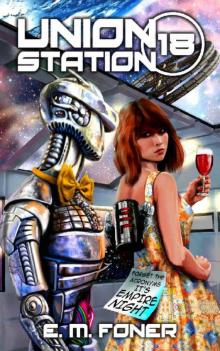 Empire Night on Union Station (EarthCent Ambassador Book 18)
Empire Night on Union Station (EarthCent Ambassador Book 18)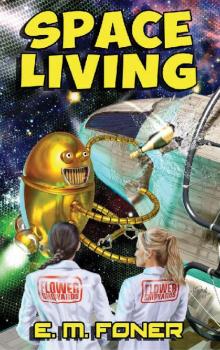 Space Living (EarthCent Universe Book 4)
Space Living (EarthCent Universe Book 4) Review Night on Union Station (EarthCent Ambassador Book 11)
Review Night on Union Station (EarthCent Ambassador Book 11) Assisted Living
Assisted Living Con Living
Con Living Freelance On The Galactic Tunnel Network
Freelance On The Galactic Tunnel Network Career Night on Union Station
Career Night on Union Station Career Night on Union Station (EarthCent Ambassador Book 15)
Career Night on Union Station (EarthCent Ambassador Book 15) Word Night on Union Station (EarthCent Ambassador Book 9)
Word Night on Union Station (EarthCent Ambassador Book 9)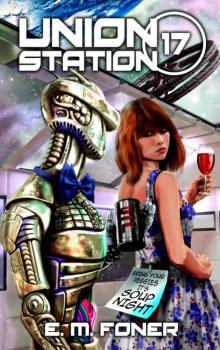 Soup Night on Union Station
Soup Night on Union Station Human Test
Human Test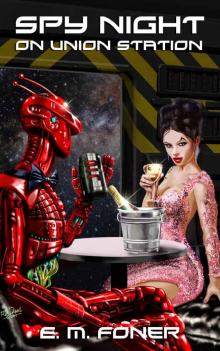 Spy Night on Union Station (EarthCent Ambassador Book 4)
Spy Night on Union Station (EarthCent Ambassador Book 4) Family Night on Union Station (EarthCent Ambassador Book 12)
Family Night on Union Station (EarthCent Ambassador Book 12) Party Night on Union Station (EarthCent Ambassador Book 10)
Party Night on Union Station (EarthCent Ambassador Book 10) Turing Test
Turing Test Alien Night on Union Station (EarthCent Ambassador Book 2)
Alien Night on Union Station (EarthCent Ambassador Book 2) Wanderers On Union Station (EarthCent Ambassador Book 6)
Wanderers On Union Station (EarthCent Ambassador Book 6) Vacation on Union Station (EarthCent Ambassador Book 7)
Vacation on Union Station (EarthCent Ambassador Book 7) Book Night on Union Station (EarthCent Ambassasor 13)
Book Night on Union Station (EarthCent Ambassasor 13) LARP Night on Union Station
LARP Night on Union Station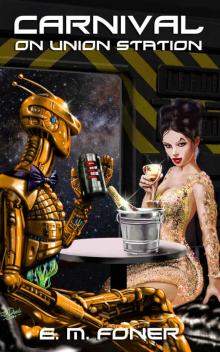 Carnival On Union Station (EarthCent Ambassador Book 5)
Carnival On Union Station (EarthCent Ambassador Book 5) LARP Night on Union Station (EarthCent Ambassador Book 14)
LARP Night on Union Station (EarthCent Ambassador Book 14) Book Night on Union Station
Book Night on Union Station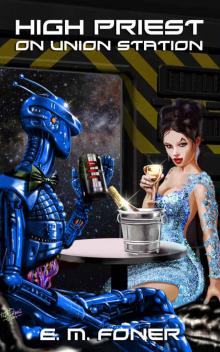 High Priest on Union Station (EarthCent Ambassador Book 3)
High Priest on Union Station (EarthCent Ambassador Book 3)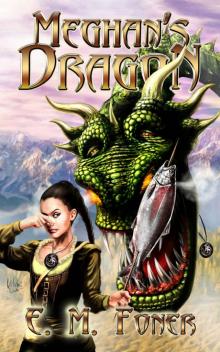 Meghan's Dragon
Meghan's Dragon Human Test (AI Diaries Book 2)
Human Test (AI Diaries Book 2)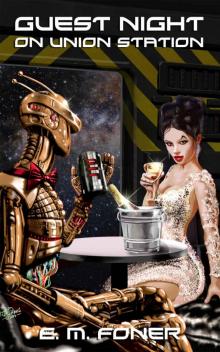 Guest Night on Union Station
Guest Night on Union Station Date Night on Union Station
Date Night on Union Station